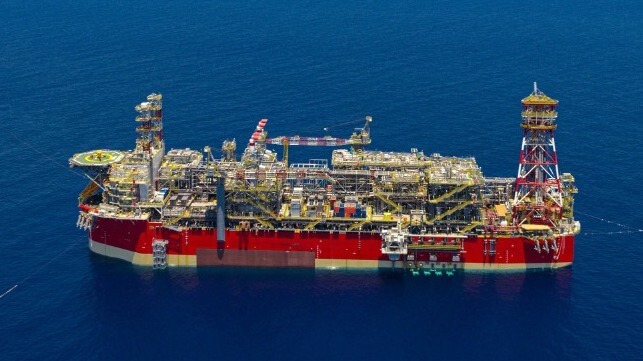With Israeli-Lebanese Accord Complete, Karish Produces First Gas

Just weeks after the completion of a new accord to settle Israel's EEZ boundary with Lebanon, energy company Energean has begun production at the Karish offshore gas field, the resource at the center of the border dispute.
According to Energean, gas has begun to flow from one of Karish's main wells and the rate is increasing. The gas flows to a newly-built FPSO, the Energean Power, which separates the product into oil, natural gas liquids and dry gas for delivery to market. As of Wednesday, the FPSO had begun handling the first stream from its first well, and it is expected to start using its export pipeline to ship gas to utility customers within the week.
Within another month, Energean plans to open two more wells, rapidly ramping up output. The FPSO can handle up to eight billion cubic meters of gas processing per year, which is nearly as much as the output of Israel's Leviathan and Tamar gas fields combined. It is expected to reach maximum capacity after an expansion project at nearby Karish North, which should be finished by the end of next year.
The start of gas production underlines the importance of the newly-agreed deal between Israel and Lebanon, which was negotiated via shuttle diplomacy by U.S. envoy Amos Hochstein. Under the final terms, Israel will keep full control of Karish. The adjacent Qana gas field will be controlled by Lebanon, though Israel will keep an equity stake in its development and will receive dividend payments from the Qana lease operator, TotalEnergies. It is not yet fully ratified, but Israel's cabinet is expected to complete that process Thursday morning.

that matters most
Get the latest maritime news delivered to your inbox daily.
Israel's new abundance of gas is opening up new possibilities for exports, including LNG shipments to customers in energy-hungry Europe. In June, the EU signed a diplomatic agreement with Israel and Egypt to increase LNG exports, leveraging Israel's abundant offshore gas reserves, an Israeli-Egyptian cross-border pipeline, and an LNG liquefaction terminal in Egypt. Though the potential capacity of the agreement is relatively small, it marks a new step in trade cooperation among the three parties.
To maximize exports to the EU gas market, Israel and Cyprus have jointly proposed a subsea pipeline connecting their offshore fields with pipeline networks in Greece. This ambitious project, EastMed, has so far failed to advance because of opposition from the government of Turkey, which disputes Cyprus' maritime claims (and has demonstrated a willingness to use force if necessary).
